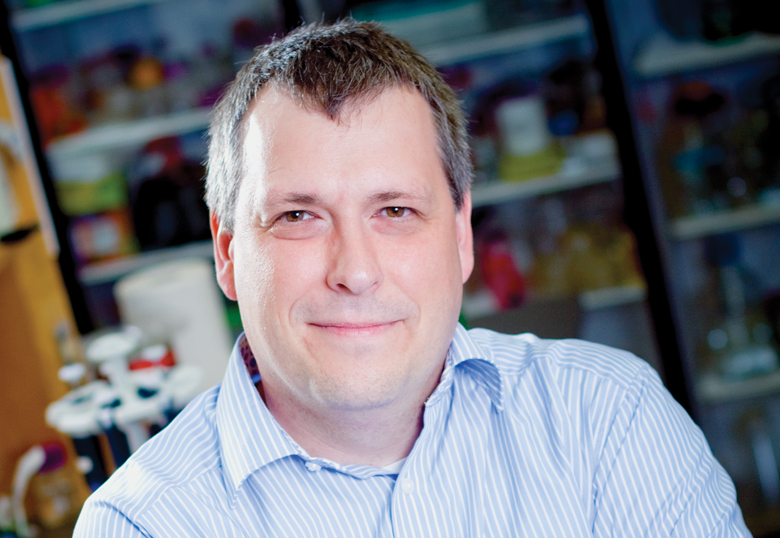A new discovery made partly by University of Lethbridge researchers could one day lead to more effective and efficient antibiotics, biofuels and other bioengineered products.

The findings reveal a protein, YjjK, which helps a cell modulate protein synthesis by throttling, or pausing, the process when the cell is low on energy. Constricting protein manufacture enables a cell under these conditions to refuel with new nutrients to the point where it can restart the synthesis process.
“It’s very comparable to the energy-saver mode on a laptop computer, which shuts down energy-expensive processes when the battery is low to prevent it from crashing,” says U of L research-team lead Dr. Hans-Joachim Wieden, associate professor of physical biochemistry in the Department of Chemistry and Biochemistry, and director of the University’s Alberta RNA Research and Training Institute (http://www.uleth.ca/research/alberta-rna-research-and-training-institute...).
The cellular function of YjjK was identified by research teams from the University of Lethbridge and Columbia University in New York, and they have since renamed the protein energy-dependent translational throttle A (EttA).
“EttA senses the energy state of the cell and, when needed, helps it save power by slowing down protein synthesis,” says Wieden.

“This is the first time to show this particular type of direct regulation of protein synthesis based on a cell’s energy level. Our research provides a detailed understanding of a novel process related to cellular function.”
This new knowledge of EttA may make it possible to develop or improve antibiotics, since about half of them target protein synthesis as part of their function. Wieden says if an antibiotic can be designed to disable the EttA protein in a harmful bacterium, it would allow protein synthesis to continue unfettered and essentially burn out the bacteria’s energy supply.
“If you lose your energy regulation, you burn and crash – that’s a potential way to harm the bacterium,” says Wieden. “The ideal situation would be to come up with a novel class of antibiotics that haven’t been used yet.”
What the researchers learned when studying EttA’s role in E. coli bacteria is that when a cell is starved of energy, the protein interacts with the cell’s ribosome, a complex molecular machine that is the main site of protein synthesis, in a process called translation. This interaction inhibits the energy-intensive process of protein manufacture by preventing the progression from the initiation stage to the elongation stage of protein synthesis. The benefit to the cell is that it can curb energy consumption until more nutrients become available to boost the cell’s energy level, ultimately enabling the cell to resume protein synthesis.
In addition to the possible benefits this research could provide in the development of future antibiotics, Wieden says it could also enhance a variety of biotechnology products – everything from biofuels to laundry detergents – that rely on the efficient production of enzymes in microorganisms.
Their findings were featured in two articles earlier this month in the journal Nature Structural and Molecular Biology (February 2014 | doi:10.1038/nsmb.2740 & doi:10.1038/nsmb.2741).
